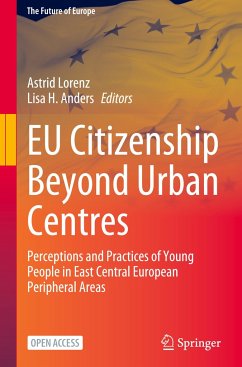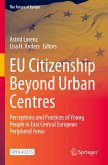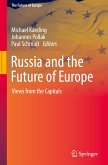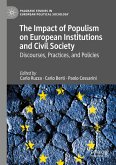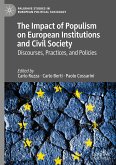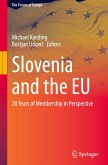EU Citizenship Beyond Urban Centres
Perceptions and Practices of Young People in East Central European Peripheral Areas
Herausgegeben:Lorenz, Astrid; Anders, Lisa H.
EU Citizenship Beyond Urban Centres
Perceptions and Practices of Young People in East Central European Peripheral Areas
Herausgegeben:Lorenz, Astrid; Anders, Lisa H.
- Gebundenes Buch
- Merkliste
- Auf die Merkliste
- Bewerten Bewerten
- Teilen
- Produkt teilen
- Produkterinnerung
- Produkterinnerung
This open access book provides in-depth and comparative analyses of how young people in peripheral areas in Poland, the Czech Republic, Slovakia, Hungary and Romania perceive EU citizenship. It also informs the reader about the challenges faced by EU Youth Dialogue projects that aim at promoting active (EU) citizenship in these areas and it offers context-specific recommendations for local, regional, national and European policymakers and people working with young people. The contributions are based on new qualitative data collected within the framework of the Jean Monnet Centre of Excellence…mehr
Andere Kunden interessierten sich auch für
![EU Citizenship Beyond Urban Centres EU Citizenship Beyond Urban Centres]() EU Citizenship Beyond Urban Centres31,99 €
EU Citizenship Beyond Urban Centres31,99 €![Russia and the Future of Europe Russia and the Future of Europe]() Russia and the Future of Europe58,99 €
Russia and the Future of Europe58,99 €![Russia and the Future of Europe Russia and the Future of Europe]() Russia and the Future of Europe43,99 €
Russia and the Future of Europe43,99 €![The Impact of Populism on European Institutions and Civil Society The Impact of Populism on European Institutions and Civil Society]() The Impact of Populism on European Institutions and Civil Society116,99 €
The Impact of Populism on European Institutions and Civil Society116,99 €![The Impact of Populism on European Institutions and Civil Society The Impact of Populism on European Institutions and Civil Society]() The Impact of Populism on European Institutions and Civil Society116,99 €
The Impact of Populism on European Institutions and Civil Society116,99 €![Climate Change and the Future of Europe Climate Change and the Future of Europe]() Climate Change and the Future of Europe43,99 €
Climate Change and the Future of Europe43,99 €![Slovenia and the EU Slovenia and the EU]() Slovenia and the EU93,99 €
Slovenia and the EU93,99 €-
-
-
This open access book provides in-depth and comparative analyses of how young people in peripheral areas in Poland, the Czech Republic, Slovakia, Hungary and Romania perceive EU citizenship. It also informs the reader about the challenges faced by EU Youth Dialogue projects that aim at promoting active (EU) citizenship in these areas and it offers context-specific recommendations for local, regional, national and European policymakers and people working with young people. The contributions are based on new qualitative data collected within the framework of the Jean Monnet Centre of Excellence at Leipzig University. It will be of interest to practitioners and scholars working on Europe and the EU, citizenship and the promotion of an active EU citizenship beyond urban centres.
Produktdetails
- Produktdetails
- The Future of Europe
- Verlag: European Commission / Springer / Springer International Publishing / Springer, Berlin
- Artikelnr. des Verlages: 978-3-031-29792-2
- 1st ed. 2023
- Seitenzahl: 260
- Erscheinungstermin: 15. Juli 2023
- Englisch
- Abmessung: 241mm x 160mm x 20mm
- Gewicht: 559g
- ISBN-13: 9783031297922
- ISBN-10: 303129792X
- Artikelnr.: 67507998
- Herstellerkennzeichnung Die Herstellerinformationen sind derzeit nicht verfügbar.
- The Future of Europe
- Verlag: European Commission / Springer / Springer International Publishing / Springer, Berlin
- Artikelnr. des Verlages: 978-3-031-29792-2
- 1st ed. 2023
- Seitenzahl: 260
- Erscheinungstermin: 15. Juli 2023
- Englisch
- Abmessung: 241mm x 160mm x 20mm
- Gewicht: 559g
- ISBN-13: 9783031297922
- ISBN-10: 303129792X
- Artikelnr.: 67507998
- Herstellerkennzeichnung Die Herstellerinformationen sind derzeit nicht verfügbar.
Dr. Astrid Lorenz is a Professor of German and European Politics, Director of the Jean Monnet Centre of Excellence "The European Union and its Rural Periphery in East Central Europe" and Dean of the Faculty of Social Sciences and Philosophy at Leipzig University, Germany. Dr. Lisa H. Anders is a member of the Jean Monnet Centre of Excellence "The European Union and its Rural Periphery in East Central Europe" and a postdoctoral researcher in the project "Rule of Law in East Central Europe" at the Institute of Political Science, Leipzig University, Germany.
Chapter 1. Approaching EU Citizenship from the Angle of Young People in the East Central European Double Periphery. Introduction.- Part 1. Perceptions of EU Citizenship and EU Citizenship Practices in Rural Areas. Evidence from Group Discussions and a Survey.- Chapter 2. Peripheral Futurities. Emigration Plans and Sense of Belonging among East Central European Youth.- Chapter 3. Notions of EU Citizenship among Young People in the Peripheral Regions of East Central Europe.- Chapter 4. No Strong Sense of Belonging and the EU as a Security-Provider - How Young People in Rural Poland Perceive EU Citizenship.- Chapter 5. European Citizenship as an Invisible Anchor. Students' EU Perceptions in Rural Peripheral Areas of the Czech Republic.- Chapter 6. Between Support and Mere Coexistence. Diverging Perspectives on the EU from Slovak Students in Peripheral Towns.- Chapter 7. An EU Providing Freedom of Movement, Health Security and Financial Support. Students' EU Perceptions in Two Hungary's Peripheral Towns.- Chapter 8. Low Attachment to an EU that is Associated with Mobility. Students' EU Perceptions in Two Romanian Peripheral Towns.- Part 2: Practices of EU Citizenship. Evidence from Erasmus+ Projects Promoting EU Citizenship within the Framework of the EU Youth Dialogue.- Chapter 9. How to Make Projects to Enhance Youth Participation Successful. A Comparative Analysis of Six Youth Dialogue Projects.- Chapter 10. Challenges for Participation and Empowerment. Six Youth Dialogue Projects in Comparative Perspective.- Chapter 11. A Project by Young People for Young People - The European Youth Week 2019 in Kielce.- Chapter 12. Initiating A Structured Dialogue between Local Youth and Decision Makers - the Minsk Mazowiecki Youth Forum.- Chapter 13. A Building Block of an Overall Strategy for Political Education - Decide on Europe.- Chapter 14. Making Young People in Remote Rural Areas Heard - (un)Attractive? II.- Chapter 15. Even Successful Projects Must End? Lessons Learned from the Project The Best is yet to Come.- Chapter 16. A School Workshop Format for Thirteen-to-Fifteen Years Old Pupils. Experiencing and Understanding Europe.- Part 3: Recommendations for Different Audiences.- Chapter 17. How to Enhance EU Citizenship in the Rural Areas of Central Europe. Recommendations for Governments and Regional Authorities.- Chapter 18. Perspectives for Digital Participation in Rural Areas: Evidence From German Regions.- Chapter 19. Promoting the Active Citizenship of Young People in Peripheral Regions: Recommendations for EU Key Players.- Chapter 20. EU Citizenship and the young people in the rural areas of East Central Europe: Three Recommendations for the research on citizenship.
Chapter 1. Approaching EU Citizenship from the Angle of Young People in the East Central European Double Periphery. Introduction.- Part 1. Perceptions of EU Citizenship and EU Citizenship Practices in Rural Areas. Evidence from Group Discussions and a Survey.- Chapter 2. Peripheral Futurities. Emigration Plans and Sense of Belonging among East Central European Youth.- Chapter 3. Notions of EU Citizenship among Young People in the Peripheral Regions of East Central Europe.- Chapter 4. No Strong Sense of Belonging and the EU as a Security-Provider - How Young People in Rural Poland Perceive EU Citizenship.- Chapter 5. European Citizenship as an Invisible Anchor. Students' EU Perceptions in Rural Peripheral Areas of the Czech Republic.- Chapter 6. Between Support and Mere Coexistence. Diverging Perspectives on the EU from Slovak Students in Peripheral Towns.- Chapter 7. An EU Providing Freedom of Movement, Health Security and Financial Support. Students' EU Perceptions in Two Hungary's Peripheral Towns.- Chapter 8. Low Attachment to an EU that is Associated with Mobility. Students' EU Perceptions in Two Romanian Peripheral Towns.- Part 2: Practices of EU Citizenship. Evidence from Erasmus+ Projects Promoting EU Citizenship within the Framework of the EU Youth Dialogue.- Chapter 9. How to Make Projects to Enhance Youth Participation Successful. A Comparative Analysis of Six Youth Dialogue Projects.- Chapter 10. Challenges for Participation and Empowerment. Six Youth Dialogue Projects in Comparative Perspective.- Chapter 11. A Project by Young People for Young People - The European Youth Week 2019 in Kielce.- Chapter 12. Initiating A Structured Dialogue between Local Youth and Decision Makers - the Minsk Mazowiecki Youth Forum.- Chapter 13. A Building Block of an Overall Strategy for Political Education - Decide on Europe.- Chapter 14. Making Young People in Remote Rural Areas Heard - (un)Attractive? II.- Chapter 15. Even Successful Projects Must End? Lessons Learned from the Project The Best is yet to Come.- Chapter 16. A School Workshop Format for Thirteen-to-Fifteen Years Old Pupils. Experiencing and Understanding Europe.- Part 3: Recommendations for Different Audiences.- Chapter 17. How to Enhance EU Citizenship in the Rural Areas of Central Europe. Recommendations for Governments and Regional Authorities.- Chapter 18. Perspectives for Digital Participation in Rural Areas: Evidence From German Regions.- Chapter 19. Promoting the Active Citizenship of Young People in Peripheral Regions: Recommendations for EU Key Players.- Chapter 20. EU Citizenship and the young people in the rural areas of East Central Europe: Three Recommendations for the research on citizenship.

